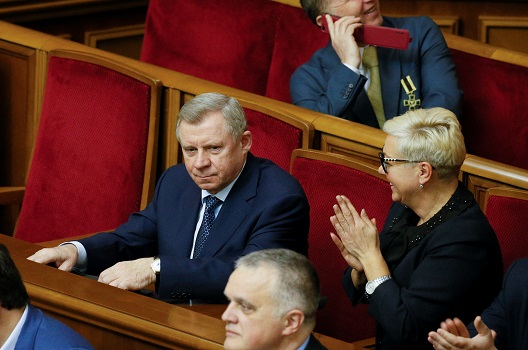 As Ukraine’s economy begins to grow modestly, its Central Bank is striving to become an anchor of stability. The country needs to preserve the fragile macroeconomic stability it has achieved and use the upswing in the global economy to conduct reforms and stimulate economic growth. The task, however, still meets formidable obstacles; a number of important reforms, including the creation of the anticorruption court, gas reform, and privatization, are held back by what many see as attempts by the oligarchs to find their way back into the system.
As Ukraine’s economy begins to grow modestly, its Central Bank is striving to become an anchor of stability. The country needs to preserve the fragile macroeconomic stability it has achieved and use the upswing in the global economy to conduct reforms and stimulate economic growth. The task, however, still meets formidable obstacles; a number of important reforms, including the creation of the anticorruption court, gas reform, and privatization, are held back by what many see as attempts by the oligarchs to find their way back into the system.
On March 15, President Petro Poroshenko picked Yakiv Smolii, a banking veteran with over three decades experience, to lead Ukraine’s Central Bank, after Valeria Gontareva resigned in May 2017. Smolii had served as the acting NBU governor for nine months.
Smolii’s formal endorsement from the president and Rada signals that the Central Bank is committed to reforms. “The appointment of the Central Bank head is the signal to international partners and Ukrainian institutions that the regulator’s policy will not change and in the future, our course stays the same, despite the expected political turbulence,” Smolii said.
Smolii has wide respect in Ukraine’s financial sector, mostly for his bank-building experience. Smolii helped transform one of the Soviet banks—Aval, so that it attracted the interest of Austria’s Raiffeisen, which bought the bank in 2005 in a transaction that made Smolii a millionaire. Smolii then developed the smaller bank PrestigeBank and sold a minority package to Austrian Erste.
Smolii has a low-profile demeanor and does not rush, a former Ukrainian banker told me. He is expected to be less hawkish when it comes to monetary tightening and banking clean-up than his predecessor.
He is rich, independent, and tough, notes Vladyslav Rashkovan, who served with Smolii as the deputy NBU governor right after the Revolution of Dignity.
“Smolii is in this position not to be corrupted, not to be influenced, and not to waste time,” Rashkovan tells me as we meet in his IMF office after the Ukraine delegation wrapped up its visit to the April IMF/WB spring meetings.
Smolii led a large delegation to the meetings, and it was a successful effort to reinforce the message of unity among Ukraine’s reformers. The delegation included Finance Minister Oleksandr Danylyuk and Naftogaz CEO Andriy Kobolyev.
“One thing that is important is that he is quite independent,” Rashkovan says of Smolii. “It is very difficult to influence his decisions from outside. But at the same time, he trusts his people, he can delegate decision-making, he relies on his team to make sure that the decisions are not politically motivated,” said Rashkovan.
During his tenure as acting NBU governor, Smolii carried out a conservative monetary policy, achieved progress in financial sector deregulation, and kept the NBU out of politics. He tried to reassure the banking sector and created conditions to resume lending. “We want to create favorable conditions for all market participants now the banking system is healthy, transparent, and clean from the problems of the past,” Smolii said.
The NBU has been consistent in gradually lifting restrictions on foreign currency and deregulating the banking sector, including the most recent decision to lift daily limits on foreign currency trading by banks, allow early repayment of foreign currency loans, and enable online document processing related to bank guarantees.
And the NBU is gradually embracing a longer-term outlook. Looking beyond the short-term, the NBU supports the adoption of a new law which would solidify the deregulation of the foreign currency market, make the market more transparent, and bring it closer to international standards and requirements of Ukraine’s Association Agreement with the EU. In March, the NBU adopted its midterm strategy, outlining major priorities for the bank’s operations.
“Economic growth” is a term which one hears more often from Smolii than his predecessors.
But what really makes the job of Ukraine’s central bank leader different this time is the institution itself.
“The NBU is not a one-man show,” Smolii admits. The NBU’s institutional capacity is the ultimate safeguard of its independence from politicians and oligarchs, and its capacity has grown undeniably since 2014.
“This is what makes this central bank different from what it was four years ago and what makes it different from other institutions in Ukraine,” Rashkovan noted. The post-2014 NBU includes decentralized decision-making processes with strong roles performed by NBU committees and the board.
“Smolii as a governor is backed by a strong institution. Even if he comes under external pressure and I think it might happen, I believe he will withstand and not only because he is a strong individual with very independent mindset, but also because he is supported by a strong institution,” Rashkovan added.
We are ready, and so are the markets.
Oksana Bedratenko is an independent analyst based in Washington, DC; she formerly served as the Senior Local Economist at the US Embassy in Kyiv. She tweets @Bedratenko.
Image: Ukraine's Central Bank Governor Yakiv Smolii is congratulated by deputies after the approval for the role during a parliament session in Kyiv, Ukraine, March 15, 2018. REUTERS/Valentyn Ogirenko

